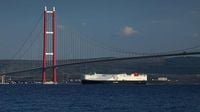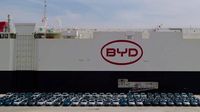In a significant boost to its operations in Türkiye, Chinese electric vehicle (EV) giant BYD's vessel, the "BYD CHANGZHOU," docked at Safiport in Derince, Kocaeli, on Sunday, April 6, 2025, carrying a staggering 7,000 vehicles. This shipment marks a pivotal moment for the company, which is rapidly expanding its footprint in the Turkish market.
The BYD CHANGZHOU set sail from the Port of Ningbo in China on February 25, 2025, embarking on a 39-day journey across the seas. Upon its arrival, the ship, measuring 199.9 meters in length and 38 meters in width, was met with excitement from local media and social media users alike. Images of the vessel navigating through Turkish waters, including passing the iconic Osmangazi Bridge and the newly built bridge in Çanakkale, quickly circulated online.
According to Anadolu Agency, the vessel’s impressive specifications include a gross tonnage of 69,250 tons and a net tonnage of 21,400 tons, enabling it to conduct large-scale shipments efficiently. The ship is equipped with a dual-fuel propulsion system that utilizes liquefied natural gas (LNG), significantly reducing carbon emissions and aligning with BYD's global sustainability goals.
BYD's commitment to Türkiye is underscored by its agreement with the Turkish government last year to invest $1 billion in establishing a production facility in the country. This facility, located in the western province of Manisa, is expected to begin operations by 2026 and will have an annual production capacity of 200,000 plug-in hybrid and fully electric vehicles. The investment is strategically important, especially considering the 17% import tariff currently imposed on Chinese-made electric vehicles entering Europe.
As of the first quarter of 2025, BYD has emerged as the fastest-growing brand in the Turkish passenger car market. Data from the Automotive Distributors and Mobility Association (ODMD) indicates that the company has made significant inroads, with a growing interest from Turkish consumers in its various models. In March 2025, BYD launched the TANG model, adding to its existing lineup, which includes DOLPHIN, ATTO 3, SEAL U DM-i, SEAL U EV, HAN, SEAL AWD, and TANG, bringing the total to seven models available in Türkiye.
Furthermore, BYD plans to introduce the new Comfort trim of the DOLPHIN in the second half of April 2025, followed by the SEALION 7 in the third quarter of the year. This expansion of its product range is expected to further enhance its appeal among Turkish consumers.
In a remarkable feat, BYD became the first automaker to cease the production of fossil fuel vehicles in 2022. The company has also set a record as the first to produce 10 million electric and plug-in hybrid vehicles. This achievement was realized through a rapid growth trajectory, where it took 15 years to produce the first 5 million new energy vehicles, while the subsequent 5 million were completed in just 15 months.
Last year, BYD sold over 4 million new energy vehicles globally, solidifying its position as a leader in the EV market. The company's success is not just limited to China; it has set its sights on the European market, where its sales are projected to surge. According to S&P Global Mobility, BYD's European sales are expected to more than double from 83,000 units in 2024 to 186,000 units in 2025, with volumes anticipated to reach nearly 400,000 units by 2029.
The buzz surrounding BYD's latest shipment has not gone unnoticed on Turkish social media. Users have taken to platforms to express their excitement, with comments highlighting the company's growing strength in the automotive market. Phrases like “an incredible growth momentum shaking up the entire auto market” and “It’s raining BYD in Türkiye” reflect the enthusiasm surrounding the brand.
BYD's commitment to sustainability and its innovative approach to vehicle production have garnered praise from consumers and industry experts alike. The company's rapid expansion in Türkiye is a testament to its strategic vision and the increasing demand for electric vehicles in the region.
In addition to BYD, other Chinese EV manufacturers, such as Chery, are exploring opportunities in Türkiye, indicating a growing interest among Chinese automakers in the Turkish market. Discussions are underway regarding potential investments to establish manufacturing plants, further enhancing Türkiye's position as a strategic hub for electric vehicle production.
As the global automotive landscape continues to evolve, BYD's significant investment and expansion in Türkiye signal a shift towards sustainable transportation solutions. With increasing consumer interest and a commitment to reducing carbon footprints, the future of electric vehicles in Türkiye looks promising.
In summary, BYD’s arrival in Türkiye with 7,000 vehicles not only highlights the company’s rapid growth but also reflects the broader trend of increasing investment in electric vehicle production. As the market adapts to new technologies and consumer preferences, BYD is poised to play a leading role in shaping the future of the automotive industry in Türkiye and beyond.





